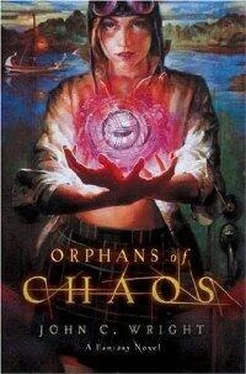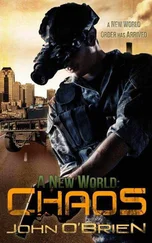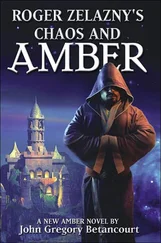Amelia Earhart seemed so brave and gay, her smile so cheerful and fearless, in the one picture in the little encyclopedia entry I found of her, that only she could be my namesake.
I told myself she had not been lost at sea, but had discovered some tropic island so fair and so like Eden, that she landed her plane at once, knowing no one else would ever be daring and cunning enough to find the route she had flown. All the years that had gone by, with her still not found, seemed to confirm my theory.
My name, invented when I was perhaps a twelve-year-old, may seem silly now. But I console myself that young Tertia named herself after a novel by William Makepeace Thackeray, so that she could be called Miss Fair. We are lucky she did not end up called Miss Pride N. Prejudice.
I cannot describe myself except to say that I am either very vain or very beautiful, and that I hope I am the latter, while suspecting I may be the former. My hair is blond, beyond shoulder length, and I liked to wear it queued up and out of the way. My complexion has been tanned by spending much time out of doors in the wind and weather.
I always had the idea, when I was young, that if I stared in the mirror long enough at some feature, my lips or eyes, some sun freckles I did not care for, or a mole, I could somehow, by force of will, “stare” my face to a more perfect shape—clearer skin, higher cheekbones, eyes greener, or more long-lashed, perhaps slightly tilted and exotic.
And because this does indeed describe me, then as now, I had always had the unspoken, haughty assumption that plain girls either lacked willpower, or lacked imagination. It is my least attractive feature, this prejudice against the unsightly, and it is based on a very wrong notion of what life is like for normal people. It gives me no pleasure to notice that many normal people have the selfsame prejudice against the plain, but with far less reason than I.
I am tall. Rather, I should say, I am tall for a girl, but I hope you will understand me if I say I was taller when I was younger. Everyone but Primus, who became Victor Invictus Triumph, was smaller than me, and I could outrun and outwrestle my two younger brothers.
I remember the day when Quartinus, who turned into Colin Iblis mac FirBolg, proved he could master me. There was some quarrel over who was to pluck apples from the tree, and I threw one at his head hard enough to raise a bruise. He grinned, as he did when he was angry, and chased me down. You see, I laughed because the last time we had raced, I had beaten him. Now he tackled me, rolled me on the ground, and took my hair in one hand to yank my head back—something he would never have done to a boy. Still, I grinned, because the last time we fought, I had toppled him downhill.
And so I struck and I wrestled and I pushed and I kicked, but my blows seemed, by some magic, to have been robbed of their force. Just one year before, he had been a child, and I could bully him. Where had my strength gone?
He pinned my wrists to the ground, and knelt on my legs to prevent me from kicking. Suddenly, the game turned into something serious, mysterious, and somehow horrible. I writhed and struggled in his grasp, and I somehow knew, knew beyond doubt, that I would never be stronger than a man again. Not ever.
Colin smiled, and ordered me to apologize, and he bent his head forward to stare into my eyes. I wonder if he was trying to awe me with his frowning gaze, to hypnotize me with his luminous blue eyes.
If so, he succeeded beyond his dreams. This boy, whom I had never really liked, now seemed inexpressibly powerful to me: manly, potent, confident. I will not tell you all my wild thoughts at that moment. But I wanted him to kiss me. Worse yet, I wanted not to want it, and to have him steal a kiss from me nonetheless.
I did not apologize, but snapped defiantly at him, “Do your worst!” And I tossed my head and yanked at my wrists in his grip. My fists seemed so little compared to his, and his grip seemed as strong as manacles. I felt entirely powerless, but the sensation seemed oddly intoxicating, rather than dreadful.
He did not do his worst. Instead, baffled, he stood up suddenly, releasing me, and seemed suddenly a boy again, a child I could defeat.
I remember we raced back toward the house, apples in our hands. We had just enough that we could throw one or two at each other, trying to bruise shins and legs.
And I won that race, that time, but he grinned and tried to make me believe he had allowed me to win.
Strangely enough, I knew he thought he was lying. And I knew he had not been.
I do not know how young I was when I performed the experiment that required me to conclude that something was wrong in my life.
Victor—so I may call him, though he was still called Primus at the time—had grown a trace of down on his upper lip, finer than the fuzz of a peach. With even this small hint of manhood, he seemed more our leader than before, and there was a newfound glamour to him that touched my heart and troubled my dreams.
We had crept by stealth from the orphanage grounds, and stood among the rocks and bald hills of the West. Below us and to the East, we could see the lights from the Main House, the servants’ quarters, the outbuildings, the stables.
Dr. Fell had bought Victor the instrument he was using for his experiment from a scientific catalogue. At the time, I thought it normal and unexceptional. Now, I realize that such an instrument was fabulously expensive: a piece of precision machinery even an observatory would envy.
The moon rose not long after sunset, and we pointed the lenses of the instrument to the East. Victor held his eye to the eyepiece and made minute adjustments to the vernier dials. He thumbed a red switch with a grimace of satisfaction.
He said, “An internal computer will track the path of the moon as it rises, and send out periodic pulses. We want to gather a number of samples, to correct for the different cords of atmosphere the signal passes through. The return signal is received by the large dish on the tripod over there, whose motors are slaved to these wheels here. And voila!”
A numerical readout lit up. It was two point something something. 2.8955. Almost three seconds.
I said, “What now?”
He said, “And now we wait four hours.”
“Did you bring anything to read?”
He just looked at me oddly.
“Or smoke?” I said.
“You are too young to smoke. Besides, it’s bad for you.”
“Quentin said you tried it. You experimented with it.”
He shook his head. “It wasn’t me. Trying things common sense abundantly demonstrates are bad for you is not an experiment; such things show you nothing but what your own tastes are. That does not constitute knowledge. This is an experiment!”
“Then who was it?”
“Who was what?”
“Quentin said he smelled smoke in the boys’ bathroom. Cigarette smoke.”
He looked at me with scathing condescension, but said nothing.
“What?” I said.
“Logic. If it wasn’t me, and it wasn’t Quentin, and it wasn’t a girl, who was it?”
“Oh,” I said, feeling sheepish.
Hours passed. I fidgeted. I paced. I complained about the cold. I sat on the ground, which made me colder. I asked him for his down jacket, which he doffed without a word and tossed to me. I rolled it up and used it as a pillow.
I must have slept.
I dreamed that I was on a boat. A man held me roughly in one arm, dangling me over the side. The boat pitched and tossed terribly; rain pelted my face and ran in icy ribbons down my flesh. The man held some sharp, horrible thing near my face: a knife, or something larger than a knife.
Читать дальше











